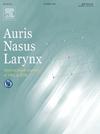Association between the Hospital Anxiety and Depression Scale and Swallowing Function in Dysphagic Patients in Japan
IF 1.5
4区 医学
Q2 OTORHINOLARYNGOLOGY
引用次数: 0
Abstract
Objective
: Dysphagia affects 2.3 %–16 % of the general population and increases with age. It can lead to malnutrition, weight loss, aspiration pneumonia, and emotional symptoms such as anxiety and depression. Mental health disorders impact appetite and muscle mass, further worsening dysphagia. Additionally, cultural and economic factors influence anxiety and depression, which can either result from or contribute to dysphagia. Studies on the relationship between anxiety, depression, and swallowing function using FEES are limited in Asian populations. The Hospital Anxiety and Depression Scale (HADS) is a useful tool for assessing mood disorders. Therefore, in this study, we aimed to investigate the associations among anxiety, depression, and swallowing function in Japanese patients with dysphagia using HADS.
Methods
: Data on age; sex; HADS; Eating Assessment Tool-10 (EAT-10); Functional Oral Intake Scale (FOIS); tongue pressure; Hyodo score, a scoring system for evaluating the swallowing function determined by flexible endoscopic evaluation of swallowing (FEES); and videofluoroscopic dysphagia scale (VDS), assessed by videofluoroscopic swallowing study, were collected and analyzed from medical records. Hyodo score consists of four parameters: (1) salivary pooling in the vallecula and piriform sinuses; (2) glottal closure reflex or cough reflex induced by touching the epiglottis or arytenoid; (3) swallowing reflex induced by colored water; and (4) extent of pharyngeal clearance after colored water is swallowed. The Mann–Whitney U test, Fisher's exact test, and multiple logistic regression analyses were used to estimate associations between HADS and swallowing function.
Results
: No significant relationships were observed between the EAT-10, FOIS, and VDS with HADS scores. Patients with depression were associated with a significantly higher percentage of anorexia complaints (p = 0.047). Lower tongue pressure was observed in patients with depression than in patients without depression (p = 0.002). Patients with anxiety had better swallowing function, as assessed by the Hyodo score (p = 0.047). Fluid clearance, a component of the Hyodo score, was significantly better in patients with anxiety (p = 0.03) even after propensity score matching adjusted for the effects of age, sex, and fluid clearance.
Conclusion
: In patients with anxiety, swallowing function assessed by FEES was favorable, whereas a higher proportion of patients with depression reported decreased appetite, and lower tongue pressure. This discrepancy between subjective dysphagia and FEES findings suggests that patients with anxiety may underestimate their swallowing function.
日本医院焦虑抑郁量表与吞咽困难患者吞咽功能的关系
目的:吞咽困难影响2.3% - 16%的普通人群,并随着年龄的增长而增加。它会导致营养不良、体重减轻、吸入性肺炎以及焦虑和抑郁等情绪症状。精神健康障碍影响食欲和肌肉质量,进一步恶化吞咽困难。此外,文化和经济因素影响焦虑和抑郁,这可能导致或促成吞咽困难。在亚洲人群中,使用FEES对焦虑、抑郁和吞咽功能之间关系的研究有限。医院焦虑和抑郁量表(HADS)是评估情绪障碍的有用工具。因此,在本研究中,我们旨在通过HADS研究日本吞咽困难患者的焦虑、抑郁和吞咽功能之间的关系。方法:年龄数据;性;有;饮食评估工具10 (EAT-10);功能性口服摄入量表;舌头的压力;Hyodo评分,一种评估吞咽功能的评分系统,通过灵活的内镜评估吞咽(FEES);并从病历资料中收集并分析经影像透视吞咽研究评估的影像透视吞咽困难量表(VDS)。Hyodo评分包括四个参数:(1)小窦和梨状窦的唾液池;(2)接触会厌或杓骨引起的声门闭合反射或咳嗽反射;(3)有色水诱导的吞咽反射;(4)吞咽有色水后咽部清除程度。采用Mann-Whitney U检验、Fisher精确检验和多元逻辑回归分析来估计HADS与吞咽功能之间的关系。结果:EAT-10、FOIS和VDS与HADS评分之间无显著关系。抑郁症患者厌食症主诉的比例显著高于抑郁症患者(p = 0.047)。抑郁患者的下舌压明显高于无抑郁患者(p = 0.002)。通过Hyodo评分(p = 0.047)评估焦虑患者的吞咽功能较好。即使在倾向评分匹配调整了年龄、性别和液体清除的影响后,焦虑患者的液体清除(Hyodo评分的一个组成部分)也明显更好(p = 0.03)。结论:在焦虑患者中,FEES评估的吞咽功能是有利的,而抑郁症患者中更高比例的患者报告食欲下降和舌压降低。主观吞咽困难和FEES研究结果之间的差异表明,焦虑患者可能低估了自己的吞咽功能。
本文章由计算机程序翻译,如有差异,请以英文原文为准。
求助全文
约1分钟内获得全文
求助全文
来源期刊

Auris Nasus Larynx
医学-耳鼻喉科学
CiteScore
3.40
自引率
5.90%
发文量
169
审稿时长
30 days
期刊介绍:
The international journal Auris Nasus Larynx provides the opportunity for rapid, carefully reviewed publications concerning the fundamental and clinical aspects of otorhinolaryngology and related fields. This includes otology, neurotology, bronchoesophagology, laryngology, rhinology, allergology, head and neck medicine and oncologic surgery, maxillofacial and plastic surgery, audiology, speech science.
Original papers, short communications and original case reports can be submitted. Reviews on recent developments are invited regularly and Letters to the Editor commenting on papers or any aspect of Auris Nasus Larynx are welcomed.
Founded in 1973 and previously published by the Society for Promotion of International Otorhinolaryngology, the journal is now the official English-language journal of the Oto-Rhino-Laryngological Society of Japan, Inc. The aim of its new international Editorial Board is to make Auris Nasus Larynx an international forum for high quality research and clinical sciences.
 求助内容:
求助内容: 应助结果提醒方式:
应助结果提醒方式:


